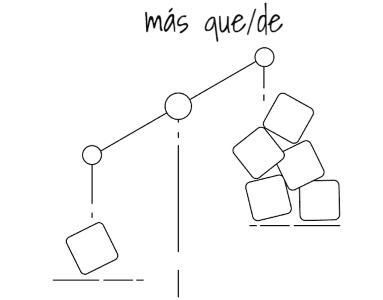In Spanish, both “más que” and “más de” are translated as “more than” in English. However, the usage of the two comparatives is different. Whereas “más que” is often used for comparison between adjectives or adverbs, “más de” is generally used with numbers and quantities.
Table of Contents
- 1. Más que = More than
- 2. Más de = More than
- More Examples of Comparison of Inequality
- “Más” vs. “Mas”
- Conclusion
1. Más que = More than
Meaning
More than (comparison)
Usage
Used to compare two things or people.
Structure
más + adjective/adverb + que
Examples
| Él está más calificado que yo. | He is more qualified than me. |
| Habla español más fluentemente que yo. | She speaks Spanish more fluently than me. |
2. Más de = More than
Meaning
More than (quantity)
Usage
Used to express a quantity greater than a specific number or amount.
Structure
más de + number/quantity
Examples
| Tengo más de veinte libros. | I have more than twenty books. |
| Viví en Madrid más de cinco años. | I lived in Madrid for more than five years. |
More Examples of Comparison of Inequality
Read more about comparison of equality, comparison of inequality, and superlatives in Spanish.
The following formula is used to express inequality when comparing two adjectives, adverbs, or nouns:
más/menos … que … more/less … than …
For example:
| Ella es más alta que su hermana. | She is taller than her sister. |
| Él habla más claro que un profesor. | He speaks more clearly than a teacher. |
| Él tiene más dinero que el presidente. | He has more money than the president. |
| Somos menos ricos que nuestros padres. | We are less rich than our parents. |
| Él habla menos claro que un profesor. | He speaks less clearly than a teacher. |
| Él tiene menos paciencia que mi hermano. | He has less patience than my brother. |
There are a few exceptions to the above formula:
| bueno | good | mejor | better |
| malo | bad | peor | worse |
| viejo | old | mayor | older |
| joven | young | menor | younger |
| grande | large | mayor | larger |
| pequeño | small | menor | smaller |
“Más” vs. “Mas“
The written acute accent in Spanish ( ´ ) is used to distinguish between the meaning of words that would otherwise be written in the same manner.
In this case, example, “mas” (formal use only) is a conjunction meaning “but,” whereas “más” means “more.”
Read more on Punctuation and Uses of Written Accents in Spanish.
Conclusion
In Spanish, both “más que” and “más de” mean “more than.” Whereas “más que” is used for comparisons, “más de” is used for quantities. Pay attention to the word following “más” to determine the correct usage. “Más que” is followed by an adjective or adverb, while “más de” is followed by a number or quantity.


